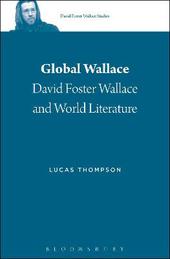
|
Global Wallace: David Foster Wallace and World Literature
Hardback
Main Details
Description
David Foster Wallace is invariably seen as an emphatically American figure. Lucas Thompson challenges this consensus, arguing that Wallace's investments in various international literary traditions are central to both his artistic practice and his critique of US culture. Thompson shows how, time and again, Wallace's fiction draws on a diverse range of global texts, appropriating various forms of world literature in the attempt to craft fiction that critiques US culture from oblique and unexpected vantage points. Using a wide range of comparative case studies, and drawing on extensive archival research, Global Wallace reveals David Foster Wallace's substantial debts to such unexpected figures as Jamaica Kincaid, Julio Cortazar, Jean Rhys, Octavio Paz, Leo Tolstoy, Zbigniew Herbert, and Albert Camus, among many others. It also offers a more comprehensive account of the key influences that Wallace scholars have already perceived, such as Fyodor Dostoevsky, Franz Kafka, and Manuel Puig. By reassessing Wallace's body of work in relation to five broadly construed geographic territories -- Latin America, Russia, Eastern Europe, France, and Africa -- the book reveals the mechanisms with which Wallace played particular literary traditions off one another, showing how he appropriated vastly different global texts within his own fiction. By expanding the geographic coordinates of Wallace's work in this way, Global Wallace reconceptualizes contemporary American fiction, as being embedded within a global exchange of texts and ideas.
Author Biography
Lucas Thompson is a Research Fellow at the United States Studies Centre at the University of Sydney, Australia. His primary research is on contemporary U.S. fiction and its intersections with world literature. Other research interests include aesthetics, affect, intertextuality, literary influence, and the relationship between film and literature.
ReviewsWhen a piece of literary criticism makes you aware at every turn of the substantial limits not just of your knowledge of a subject-one you thought you knew something about-but also of the frameworks in which you think, its worth and importance are blindingly obvious. Such was my experience in reading Lucas Thompson's Global Wallace: David Foster Wallace and World Literature. Its well-researched and wide-ranging attention to Wallace's global influences and intertexts should also be a shot of adrenaline into a Wallace Studies. ... Thompson's book is itself a model of diligent criticism-impeccably researched, clearly written and organized, and (increasingly rare in new work on Wallace) appropriately contextualized in the rich network of Wallace criticism that came before it. ... It will prompt critics to bring a variety of new lenses to bear on his fiction and nonfiction, likely generating an abundance of exciting new readings and pathways for readings in classrooms and on the page. * Comparative Literature Studies * Global Wallace has great merit for turning the notion of Wallace's exceptionalism on its head. * Times Literary Supplement * Unique in the growing corpus of Wallace scholarship, Global Wallace convincingly identifies the author as a literary flaneur without disavowing his definite provincialism. Traveling with Wallace on his readerly journeys, Thompson argues for the ways in which this consequential writer, who is so keen on the rich particular, engaged with 'universal truths and themes' that resonate around the world and in otherworldly regions of the United States. * Heather Houser, Associate Professor of English, University of Texas at Austin, USA * David Foster Wallace may have written books in and about the heart of his country, but his reading took him around the world. We know that he looked to Dostoevsky and Kafka as models, but what about Borges, Cortazar, and Puig? What about Jamaica Kincaid? Or the role of Tolstoy's The Death of Ivan Ilych in "Good Old Neon"? Lucas Thompson's illuminating Global Wallace attends to these and many other influences and intertexts as it mines little-examined parts of Wallace's publications, library, and archive. Thompson also helps us understand Wallace's tricky relationship to race, and he recalibrates our sense of what in Wallace counts as innovation and what as appropriation. This book is a rigorous and lucid argument for greatly expanding the map on which scholars have placed one of our most important writers. * Jeffrey Severs, Associate Professor of English, University of British Columbia, Canada * A genuinely novel intervention into the critical landscape. It is a significant addition to the critical body of Wallace Studies. * Modern Language Review * "Thompson's argument opens up a new way of looking at Wallace both as an isolated author and as part of a vast global literary tradition...[His] rigorous and exhaustive archival work will undoubtedly make Global Wallace an invaluable resource for future Wallace scholars....Thompson's ability to read across a broad constellation of literary influence while also turning his focus inwards, to the very: mechanics of Wallace's writing, produces fascinating insights. In doing so, Thompson provides one of the most comprehensive close analyses of Wallace's style produced to date. No doubt Global Wallace will become a touchstone text for scholars of Wallace new and old." -- Lola Boorman * The Australasian Journal of American Studies *
|